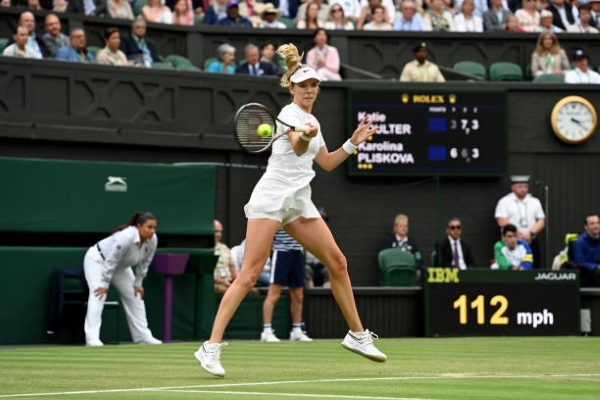The warm-up was pretty good, with Dan Evans winning in Nottingham and Ryan Peniston, Harriet Dart and other British players producing superb performances at Queen’s, Eastbourne and elsewhere in the weeks leading up to Wimbledon. But the main event is proving even better, with Heather Watson leading the way into the second week at Wimbledon and several other players, notably Katie Boulter and Liam Broady, producing the best performances of their career to achieve the biggest victories of their career.
Wondrous Watson
Heather Watson has been almost as much of a fixture at Wimbledon this week as the eternal strawberries and cream, because rain delays and the subsequent rearrangement of matches have meant that she has played every single day this week. However, it has all been worth it, because for the first time ever she has reached the second week of a Slam.
Watson had been to the third round at Wimbledon three times before, most notably in 2015, when she played Serena Williams and nearly won against arguably the greatest female tennis player ever. But neither at Wimbledon nor at any other Major had she ever reached the last 16 before – until now.
In her round of 32 match, Watson played Kaia Juvan of Slovenia, who, at 21, is nearly a decade younger than her (Watson turned 30 in May). In addition, Juvan, the current world #62, was also ranked far higher than Watson, who had slipped outside the world’s top 100 after a pandemic-related loss of form. Consequently, she could only hope that her superior experience and the support of the home crowd could inspire her to victory.
Ultimately it did, but not before what might be called a classic “Watson Wobble”. Having won an extremely tight first set on a tie-break, Watson initially capitalised on her opponent’s disappointment to race into a 5-0 lead in the second set. However, just as it looked as if she would bagel the Slovenian to stroll into the fourth round, Watson seemed to be gripped by nerves (despite denying it after the match) and was broken while serving for the match. Then, when Juvan held her serve and suddenly rediscovered her own top form, it appeared as if Watson might suffer one of the all-time great chokes.
The eighth game of the second set lasted well over eight minutes, as Juvan held numerous breakpoints. Then Watson somehow closed out the game and the match with a last, lunging volley to cut off a Juvan cross-court pass. She eventually collapsed on the turf, obviously overcome by the emotion of finally going where she had never gone before. The 2008 Junior US Open Champion will almost certainly never win a Major (like most Junior Major winners), but for now finally reaching the last 16 at Wimbledon, her home Slam, after a dozen years of trying was some form of compensation.
Brave Boulter
If Heather Watson had shown sporting courage in finally defeating Juvan, Katie Boulter showed actual courage, or at the very least extraordinary resilience, in beating Karolína Plíšková to reach the third round at Wimbledon. That was because, as the world learned after the match, her beloved grandmother had died only a few days before. However, the fact that her grandfather set aside his own grief to appear in the player’s box on Centre Court probably gave her the inspiration she needed to beat last year’s Wimbledon runner-up.
It is never easy playing, let alone beating, the same player twice in succession, especially when you play them twice in a week and even more so when the player in question is as accomplished as Plíšková. But having beaten the Czech in the round of 16 at Eastbourne last week, Boulter improved upon that performance at Wimbledon. After conceding the first set to Plíšková, she literally roared back to win the second set on a tie-break, before breaking Plíšková’s serve in the ninth game of the third set and then serving out to win the match.
Quite apart from her recent bereavement, Boulter has been beset by injuries (the bane of any professional sportsperson’s life) for the last few years. That pattern continued into this year, to the extent that she had to miss the whole of March while resting, recuperating and rehabbing. But now that she finally seems to be enjoying an injury-free couple of months, she is reminding everyone that she has a power game, including the requisite powerful serve, to challenge any other woman on tour – even Iga Swiatek, the current world #1, who is not yet as dominant on grass as she has been on every other surface.
In the third round, Boulter will play Harmony Tan, the conqueror of Serena Williams in the first round. It is a winnable match for both women, but with Boulter likely to be on a show-court again and therefore likely to enjoy the support of a large home crowd, she has a good chance of following Heather Watson into the fourth round.
And Brilliant Broady
Notwithstanding the excellence of Boulter’s victory over Plíšková, the single best British performance of the first week at Wimbledon was undoubtedly that of Liam Broady, who beat the 12th seed, Diego Schwarzman, in an epic five-setter, 6-2, 4-6, 0-6, 7-6, 6-1. Although grass is far from the favourite surface of clay-specialist Schwarzman, it was still the best performance and result of Broady’s career, not least because at one point in the middle of the match he lost 11 games in a row and seemed destined to slump to defeat. But Broady, just like Boulter before him and Watson afterwards, recovered spectacularly to win the last two sets. Indeed, having won the fourth set tie-break narrowly, he seemed to break Schwarzman’s spirit and ultimately won the fifth set relatively easily.
Broady has been the nearly man of British tennis for so long, a universally popular player who has never quite been able to cut it on the ATP Tour and so has had to struggle to survive on the Challenger and Futures] Tours. Even this summer, when the likes of Ryan Peniston and Jack Draper have enjoyed superb runs at Queen’s and Eastbourne respectively, he seemed unable to emerge from the shadows. But now he has reached the third round of a Major for the first time, where he will face Draper’s conqueror, Australia’s Alex de Minaur (who, coincidentally, is Katie Boulter’s boyfriend).
Andy Murray’s Resilience Is Obviously Inspiring Others
Many reasons have been put forward for the renaissance of British tennis this summer, with over half a dozen women and a similar number of men producing career-best performances and, even more impressively, some of them continuing that form at Wimbledon. Among them is the greater camaraderie among the British players that was generated by the “Battle of the Brits” tournaments two years ago, during lockdown, when all the British players, male and female, were brought together by the LTA in a series of individual and team events behind closed doors.
Equally, the Emma Raducanu effect has been considerable, especially on her fellow British women. Prior to reaching the fourth round at Wimbledon last summer and then stunning the tennis world by winning the US Open last September, Raducanu had not been earmarked as being immeasurably better than all the other British women. Consequently, the fact that she could win a Major from the qualifiers has undoubtedly inspired other British players, such as Boulter, to think, “Well, if she can do it, why can’t I?”
However, probably the single most important influence on the recent resurgence of British tennis has been the enduring example of Andy Murray. The Great Scot may have made his earliest ever m, in the second round, this week, but that is virtually irrelevant when one considers what he has been through over the last six years.
Murray’s career has almost been one of two halves, with the first half culminating in his spectacular 2016 season, when he won Wimbledon and the Olympic Singles gold (both for the second time) before chasing down Novak Djokovic and finally overtaking him to reach the world #1 spot at the end of the year. That achievement made him the only man outside The Gigantic Three of Djokovic, Nadal and Federer to reach the top spot in men’s tennis in the last two decades.
Nevertheless, for all the glory of the first half of Murray’s career, it is arguably the resilience that has been the hallmark of the second half of his career that has been most inspiring to his younger compatriots. When Murray was winning Wimbledon and Olympic Gold, it was easy to think that it was the natural result of God-given talent – the kind of talent that, by definition, is only ever doled out to a select few. But in complete contrast, the almost pathological desire to keep playing tennis that he has exhibited in recent years, when he has had to have so many different surgical procedures, may have been even more inspiring to his fellow Brits than his earlier triumphs. The injuries made him mortal and therefore more like them.
Perhaps, just perhaps, it was the memory of Murray and his battle against the dying of his once brilliant light that inspired Watson to overcome her wobble, Boulter to keep battling against both a far higher-ranked opponent and her own sense of loss after the death of her grandfather, and Liam Broady to keep going after losing 11 games in a row to Diego Schwarzman. If so, then that inspiration, even more than the Wimbledon titles, will be Andy Murray’s lasting legacy to British tennis.
Main photo:
Embed from Getty Images






